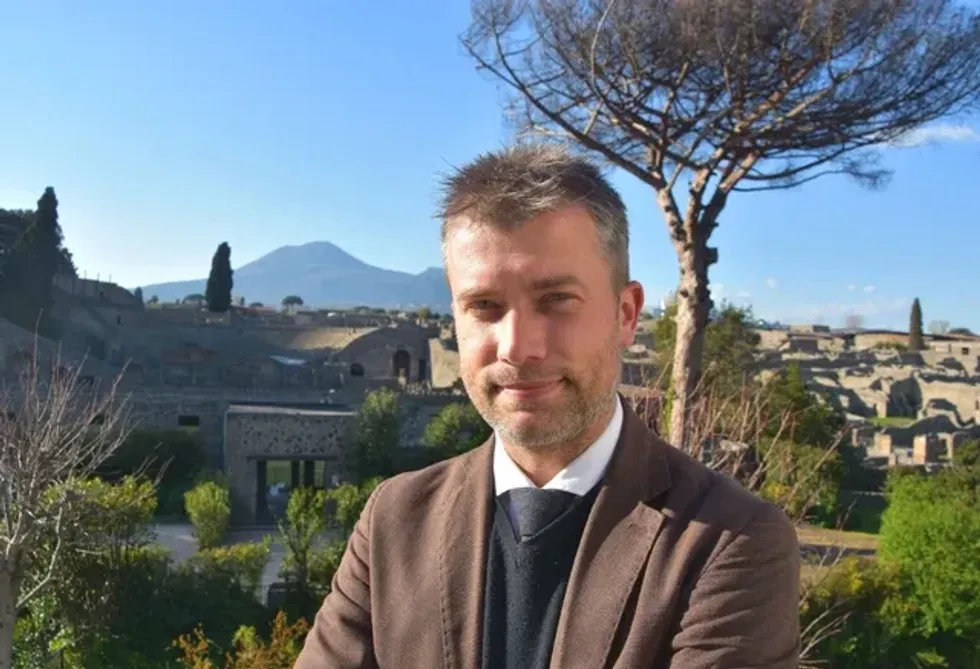Ancient Roman mosaic stolen by Nazis during WW2 finally returned to rightful home

Mind-Blowing Archaeological Discoveries That Bring History Back to Life |
GB NEWS
The mosaic is deemed by experts to be a work of 'extraordinary cultural interest'
Don't Miss
Most Read
An ancient erotic mosaic, which was stolen by Nazis during the Second World War, has been returned to its rightful home in Pompeii after nearly 80 years.
The mosaic panel, which features a pair of lovers, was returned to Pompeii’s archaeological park on Tuesday.
The piece, which is mounted on travertine slabs, was taken from the area around Pompeii, near Naples, during the Second World War by a German Nazi captain who was assigned to military logistics in Italy.
The captain then gifted it to a civilian, who kept it until his death.
It was the civilian’s heirs who, upon realising the piece’s origin, contacted the Italian authorities to arrange its return.
Gabriel Zuchtriegel, Director of the Archaeological Park of Pompeii and co-author of an essay dedicated to the returned work, suggested the return of the stolen art shows a shift in the mentality towards stolen works of art as “the sense of possession becomes a heavy burden”.
He said: “Today’s return is like healing an open wound.”
The mosaic dates back to between mid-to-late first century BC and the first century AD, and is deemed by experts to be a work of “extraordinary cultural interest”.

Gabriel Zuchtriegel suggested the return of the stolen art shows a shift in the mentality towards stolen works of art as “the sense of possession becomes a heavy burden”.
|PARCO ARCHEOLOGICO DI POMPEI
Discussing the importance of the work, Zuchtriegel said: “While the Hellenistic period, from the fourth to the first century BC, exalted the passion of mythological and heroic figures, now we see a new theme.
“It is the moment when the theme of domestic love becomes an artistic subject.”
However, Zuchtriegel did note that the male figure’s expression “seems almost a little bored”.
The artwork was repatriated to Italy from Germany via diplomatic channels after the heir of the mosaic’s last owner reached out to the Carabinieri unit in Rome.
LATEST ARCHAEOLOGICAL DEVELOPMENTS:

The panel has been allocated to the Archaeological Park of Pompeii where it will be catalogued and safeguarded whilst also being made accessible for education and research purposes.
|GETTY
The Carabinieri Unit for the safeguarding of the cultural patrimony was established in 1969 to “tackle, with the effectiveness of targeted tools and interventions, the alarming phenomenon of the depletion of the largest museum of the world: Italy”.
Authorities then undertook checks to confirm the piece’s authenticity and provenance, before it was successfully repatriated in September 2023, organised by the Italian consulate in Stuttgart.
The panel has now been allocated to the Archaeological Park of Pompeii, where it will be catalogued and safeguarded whilst also being made accessible for education and research purposes.
There have been many instances of items being stolen from Pompeii, including civilians taking small items like rocks.
However, there is a widely known superstition, called the “Pompeii curse”, which suggests anyone who takes artefacts from the area will suffer bad luck or misfortune.
In 2020, a Canadian tourist who had removed two mosaic tiles and parts of an amphora from Pompeii returned them, stating they had brought her years of bad luck.
And, in 2019, then German Foreign Minister Heiko Maas visited Florence to return a painting which was looted by the Nazis.
“Vase of Flowers”, painted by Dutch Baroque painter Jan van Huysum, was stolen from the Uffizi Gallery by the Wehrmacht in 1943.










